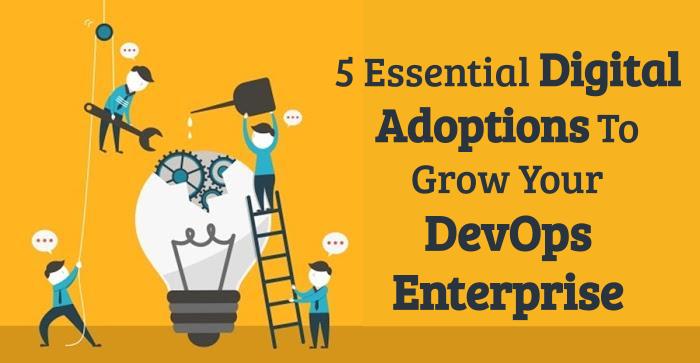
There are several essential digital adoptions to grow your DevOps enterprise. Studies show that the DevOps market is projected to expand to over $10 billion by 2025. In 2020, the software development demand is already increasing due to the novel coronavirus. As an enterprise developer, you know how DevOps communication and collaboration strategies can streamline your software pipeline for rapid deployment. To cope with the current climate, there are several enterprise conferencing tools due to Coronavirus. Despite the promises associated with these methodologies, enterprise developments can still fail to make their development ecosystem efficient without the proper upgraded technologies. Read on to discover several essential digital adoptions to grow your DevOps enterprise.
Source Code Management Tools
For your enterprise development team to keep up with the growing market demand, it is essential to implement source code management (SCM) tools. When properly implemented, these SCM tools are an essential resource to tackle insider threats to enterprise data.
Some of the top source code management tools allow you to monitor the progress of your development work, save different versions of your source code, and return to previous versions when needed. This streamlines experimentation within your software development lifecycle. To take a case in point, you can merge various features of your program when they are ready for delivery. To integrate SCM tools with your DevOps workflow, you need to host repositories for your enterprise team to push their work. It is essential to adopt source code management tools to grow your DevOps enterprise.
Also Read Has the Pandemic Made DevOps Tougher or Easier?
Containerization Platforms
Furthermore, it is imperative for your software engineering team to adopt containerization platforms for your DevOps enterprise to grow. With container orchestrations such as Docker or Kubernetes, you can break larger software applications and projects into microservices running in container environments. To choose the best containerization platform for your team, you should analyze your architecture as well as your objectives you are aiming to meet by implementing microservices. Regardless of your choice, containers can greatly benefit speed and reliability throughout the phases of your software development lifecycle (SDLC). Containerization platforms are a valuable, reliable resource to expand your enterprise and increase efficiency.
Structured Library Loggers
Structured library loggers are another essential digital adoption to grow your enterprise software development. Typically, log files are one of the most valuable assets that a developer has. Because log files are usually unstructured text data, they can be difficult to accurately utilize. Fortunately, structured loggers solve these problems to enable your log files to machine-readable for advanced functionality. For instance, logrus is a structured logger for Golang that’s API compatible with the standard library logger. This tool can give your team increased flexibility. It also processes and searches web server access logs for summarization, aggregation, or troubleshooting production. Structured library loggers are imperative digital adoptions to optimize your enterprise.
Advanced Monitoring Systems
In addition, advanced monitoring systems are another digital solution your DevOps enterprise team needs to adopt for optimal growth. To fuel growth for your DevOps enterprise, it is essential to adopt the best cloud monitoring practices. For instance, certain lightweight open source monitoring systems can give you valuable insight about your metrics and real-time performance of your applications’ functionality. Some of the most advanced monitoring systems are also versatile, supporting Linux servers and containerization monitoring. Additionally, certain systems are Software as a Service (SaaS)-based applications compatible with a diverse spread of programming languages. Many are also specifically built for cloud environments and designed to be easily deployable. Advanced monitoring systems can offer your enterprise valuable insight to maximize efficiency as your development team expands.
Also Read The Critical Collaboration: Cybersecurity and DevOps
CI/CD Servers
Additionally, continuous integration and delivery (CI/CD) servers are crucial to grow your DevOps enterprise. Automating coding, building, and testing procedures is a core component of any DevOps development team. CI/CD tools can facilitate merging processes and checking code into shared repositories for a higher deployment volume. CI/CD servers can help you automate functional and nonfunctional tests as well as configurations. This can help you free up your DevOps manual resources to complete other tasks. Certain CI/CD servers can integrate with various systems to distribute work across multiple platforms. It is crucial for your enterprise to adopt CI/CD servers to automate processes for rapid deployment in your development pipeline.
There are several digital adoptions to grow your DevOps enterprise. For example, source code management tools can help you streamline program experimentation version comparisons. In addition, advanced monitoring systems can provide insight about your metrics and application performance functionality. Moreover, structured library loggers are another digital adoption that can improve flexibility in your DevOps team. Additionally, CI/CD servers also grow your enterprise with their automation processes for rapid deployment. These are the essential digital adoptions to grow your DevOps enterprise.
BDCC
Latest posts by BDCC (see all)
- Four Steps to Balance Agility and Security in DevSecOps - April 22, 2025
- Enhancing Security Posture with Azure’s AI-Driven Threat Detection - April 15, 2025
- Why Golang is Becoming the Go-To Language for DevOps Engineers - April 11, 2025

